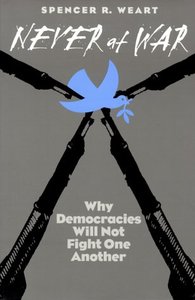Never at War
 |
|
| Author | Spencer R. Weart |
|---|---|
| Publisher | Yale University Press |
|
Publication date
|
1998 |
| Pages | 424 pp. |
| ISBN | |
| OCLC | 38249676 |
Never at War: Why Democracies Will Not Fight One Another is a book by the historian and physicist Spencer R. Weart published by Yale University Press in 1998. It examines political and military conflicts throughout human history and finds no exception to one of the claims made by the controversial democratic peace theory: well-established liberal democracies have never made war on one another. In addition to the democratic peace, Weart argues that there is also an oligarchic peace and provides a new explanation for both the democratic and oligarchic peace. The book is often mentioned in the academic debate and has received both praise and criticism.
Due to the long time period, Weart has often relied on the works of other historians but has consulted at least five works for even trivial crises involving democracies and oligarchies. Some cases have never been studied with this question in mind and he has then used primary sources which included reading works in French, German (including Alemannic German), Italian (including the Tuscan dialect), Spanish, Greek and Latin.
The book classifies human societies into four broad groups:
Looking at a borderline case, the Athenian democracy that excluded metics and slaves, Weart argues that it was a democracy since appearance alone could not decide who was a citizen, citizens could become slaves and slaves could become free, citizens could be poorer than slaves, and slaves could work for example as bankers. The metics were even harder to tell from the citizens. Typically the citizens and the non-citizens worked alongside under similar conditions. Thus, the non-citizens were so interwoven through the community that their views were probably represented by the citizens on most issues. Some aspects of the direct democracy practiced in Athens may have been more open and democratic than the representative democracy used today. In contrast, the Confederate States of America was an oligarchy.
...
Wikipedia
